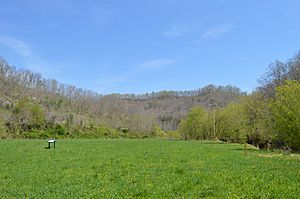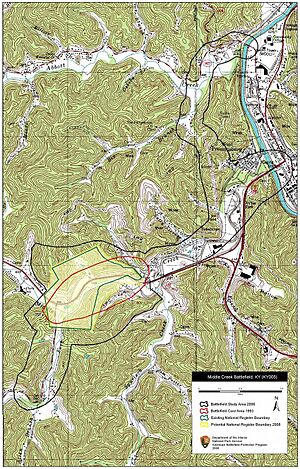Battle of Middle Creek facts for kids
Quick facts for kids Battle of Middle Creek |
|||||||
|---|---|---|---|---|---|---|---|
| Part of the American Civil War | |||||||
 Eastern portion of the field, looking toward Garfield's command post |
|||||||
|
|||||||
| Belligerents | |||||||
| Commanders and leaders | |||||||
| James A. Garfield | Humphrey Marshall | ||||||
| Units involved | |||||||
| 18th Brigade (consisted of 14th Kentucky (USA), 22nd Kentucky (USA), 1st Kentucky Cavalry (USA), 40th Ohio, and 42nd Ohio) | (5th Kentucky (CSA), 54th Virginia, Jeffress' Artillery Battery, cavalry companies of Cameron, Clay, Holliday, Shawhan, Stone, Thomas) | ||||||
| Strength | |||||||
| 2,100 | 2,500 | ||||||
| Casualties and losses | |||||||
| 27 | 65 | ||||||
|
Middle Creek Battlefield
|
|
| Lua error in Module:Location_map at line 420: attempt to index field 'wikibase' (a nil value). | |
| Nearest city | Prestonsburg, Kentucky |
|---|---|
| Built | 1862 |
| NRHP reference No. | 91001665 |
| Added to NRHP | March 26, 1992 |
The Battle of Middle Creek was an important fight during the American Civil War. It happened on January 10, 1862, in eastern Kentucky. This battle was a victory for the Union side. It helped the Union gain control of Kentucky early in the war.
Contents
Why Did the Battle of Middle Creek Happen?
Confederate Plans in Eastern Kentucky
About a month after a fight at Ivy Mountain, a Confederate general named Humphrey Marshall led his troops into Eastern Kentucky. His main goal was to find and recruit more soldiers for the Confederate side.
General Marshall set up his base in Paintsville. This town is located on the Levisa Fork of the Big Sandy River. By early January, he had gathered over 2,000 men. However, he didn't have enough weapons or supplies for all of them.
What Happened During the Battle?
Union Forces Advance
The Union's General Don Carlos Buell ordered Colonel James A. Garfield to stop Marshall. Garfield's mission was to make Marshall's forces retreat back into Virginia.
Garfield started his march from Louisa. He took charge of the 18th Brigade. As he moved south towards Paintsville, the Confederates had to leave the town. They retreated to an area near Prestonsburg.
The Fight at Middle Creek
Colonel Garfield's advance was slow. The area was swampy, and there were many streams. This made it hard for his troops to move quickly. He finally reached Marshall's location on January 9.
Early on January 10, Garfield's troops began their attack. They marched west near the Forks of Middle Creek. They first fought off some Confederate cavalry. Then, they turned west to directly attack General Marshall's main force.
Marshall had positioned his men north and east of the creek. Garfield's attack began shortly after noon. The fighting lasted for most of the afternoon. Union reinforcements arrived just in time. Their arrival stopped the Confederates from attacking the Union's left side.
Confederate Retreat
Instead of continuing the fight, the Confederates decided to retreat south. They were later ordered to go all the way back to Virginia on January 24.
After the battle, Garfield's Union forces moved to Prestonsburg. Then, they went back to Paintsville. The Battle of Middle Creek showed that the Union forces were still strong. It also stopped the Confederate plans in Kentucky for 1861.
What Was the Outcome?
Union Control in Kentucky
The Battle of Middle Creek was a big win for the Union. It happened just over a week before another important Union victory, the Battle of Mill Springs. These two battles helped the Union gain strong control over Eastern Kentucky. This control lasted until Confederate General Braxton Bragg launched a new attack later in 1862.
After these victories in January, the Union forces were able to push the war into Tennessee in February.
Battlefield Recognition
In October 1992, the Middle Creek battlefield was recognized as a National Historic Landmark. This means it's a very important historical site. It is managed by the National Park Service.
 | Calvin Brent |
 | Walter T. Bailey |
 | Martha Cassell Thompson |
 | Alberta Jeannette Cassell |


